Pablo Arias
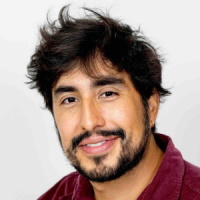
I am Pablo Arias Sarah, a Lecturer recently appointed to the University of Glasgow, in the School of Neuroscience and Psychology. I study human social interaction mechanisms using real time voice/face transformations. To do this, we developed a videoconference experimental platform called DuckSoup which enables researchers to transform participants' voice and face (e.g. increase participants' smiles or their vocal intonations) in real time during free social interactions. We use these paradigms to study social cognition (e.g. social biases, social alignment).
Biography
I hold a PhD in cognitive science from Sorbonne University, a Master of Engineering in digital technologies and multimedia from Polytech' Nantes, and a Master of Science in acoustics, signal processing and computer science applied to sound, from IRCAM.
Biography
I hold a PhD in cognitive science from Sorbonne University, a Master of Engineering in digital technologies and multimedia from Polytech' Nantes, and a Master of Science in acoustics, signal processing and computer science applied to sound, from IRCAM.
Dale Barr
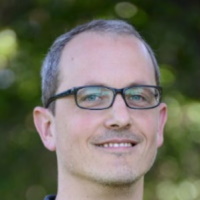
I am Dale Barr, a Senior Lecturer here at the School of Psychology and Neuroscience. My main areas of interest are psycholinguistics, statistical modelling, and cognitive science. Most of my work consists of empirical investigations into the cognitive representations and processes underlying spoken dialogue. I have published work on topics including pragmatics, perspective-taking, lexical processing, cultural evolution, speech rhythm, disfluency, and multimodal signaling. My recent work investigates how language users integrate linguistic and situational information (such as interlocutors' beliefs and goals) within the constraints of real-time dialogue. My research uses a variety of methodologies from visual-world eyetracking, EEG, and MEG to computational modeling and Monte Carlo simulation. I have also contributed to statistical methodology, developing techniques for time-series analysis of visual-world eyetracking data, as well as for linear mixed-effects modeling. I am a founding member of the PsyTeachR teaching team at the University of Glasgow (psyteachr.github.io), which developed an award-winning curriculum promoting reproducible data analysis.
Biography
I received a PhD in Psychology from the University of Chicago (USA) in 1999.
Biography
I received a PhD in Psychology from the University of Chicago (USA) in 1999.
Lawrence Barsalou
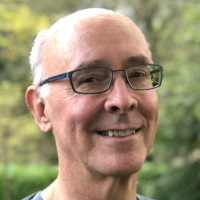
I am a Professor of Cognitive Science here in the School of Psychlogy & Neuroscience. My research addresses the nature of human conceptual processing and its roles in perception, memory, language, thought, social interaction, and health cognition. A current theme of this research is that the conceptual system is grounded in multimodal simulation, situated conceptualization, and embodiment. Specific topics of current interest include the roles of conceptual processing in emotion, stress, abstract thought, self, appetitive behavior, and contemplative practices. My research also addresses the dynamic online construction of conceptual representations, the development of conceptual systems to support goal achievement, and the structure of knowledge. For further information and lab publications, please visit our lab.
Biography
I received a Bachelors degree in Psychology from the University of California, San Diego in 1977, and a Ph.D. in Psychology from Stanford University in 1981. Before coming to the University of Glasgow, I held faculty positions at Emory University, the Georgia Institute of Technology, and the University of Chicago.
Biography
I received a Bachelors degree in Psychology from the University of California, San Diego in 1977, and a Ph.D. in Psychology from Stanford University in 1981. Before coming to the University of Glasgow, I held faculty positions at Emory University, the Georgia Institute of Technology, and the University of Chicago.
Andrew Bell
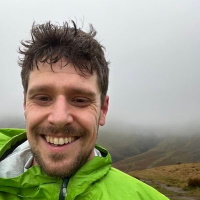
My name is Andy Bell: I am a specialist veterinary anaesthetist and pain researcher and current Wellcome Clinical Research Fellow. My clinical interests centre around the measurement and treatment of pain in veterinary species. I also conduct discovery neuroscience research into spinal cord pain mechanisms. I am particulary interested in unravelling the heterogeneity amongst the neurons that make up pain and itch circuits in the dorsal horn of the spinal cord. I use a variety of molecular, anatomical and behavioral techniques to investigate what defines neuronal identity and how this contributes to abnormal sensory function in pain states.
Mick Craig
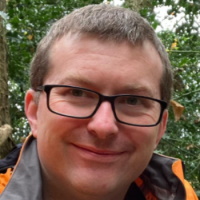
My name is Mick craig: I am a Senior Lecturer in the School of Psychology & Neuroscience, interested in how interneurons can control synchronous neuronal network activity, and how different brain regions coordinate their activity across long distances. While comprising only a small percentage of cortical neurons, inhibitory interneurons play a fundamental role in coordinating and pacing the rhythm of neuronal oscillations. My previous work has included studying slow oscillations in sensory and entorhinal cortices, and faster rhythms (gamma oscillations and sharp-wave ripples) in the hippocampus.
The research in my group uses a combination of virus-assisted circuit mapping, patch-clamp and in vivo electrophysiological recordings, combined with optogenetics / chemogenetics and behaviour, to understand the cellular circuitry through which different brain regions communicate across long distances. We focus principally in Papez circuit, with a particular interest in how the anterior thalamic nuclei and thalamic nucleus reuniens can mediate communciation through this 'extended memory circuit'. We are also interested in studying how these long-range projections are disrupted in mouse models of psychiatric and neurodegenerative disorders.
Biography
I completed my undergraduate degree in Neuroscience at the University of Glasgow in 2006. This degree included a year in the pharmaceutical industry, where I carried out schizophrenia research at Merck, Sharp and Dohme in Harlow, Essex. I then moved to the University of Oxford to study on a four year Wellcome Trust DPhil in the OXION programme, working with Prof Ole Paulsen and Dr Louise Upton, graduating in 2011.
In the final year of my doctoral studies, Prof Paulsen moved to the University of Cambridge to take up the Chair of Physiology, so after completing my DPhil, I spent a few months in Cambridge before moving to the National Institutes of Health (Bethesda, USA) in 2011, to work as a Postdoctoral Visiting Fellow in the group of Dr Chris McBain.
I moved back to the UK in early 2016 to establish my research group at the University of Exeter on an early career fellowship funded by the Vandervell Foundation, before taking up a Senior Lecturer position here in Glasgow in 2020.
The research in my group uses a combination of virus-assisted circuit mapping, patch-clamp and in vivo electrophysiological recordings, combined with optogenetics / chemogenetics and behaviour, to understand the cellular circuitry through which different brain regions communicate across long distances. We focus principally in Papez circuit, with a particular interest in how the anterior thalamic nuclei and thalamic nucleus reuniens can mediate communciation through this 'extended memory circuit'. We are also interested in studying how these long-range projections are disrupted in mouse models of psychiatric and neurodegenerative disorders.
Biography
I completed my undergraduate degree in Neuroscience at the University of Glasgow in 2006. This degree included a year in the pharmaceutical industry, where I carried out schizophrenia research at Merck, Sharp and Dohme in Harlow, Essex. I then moved to the University of Oxford to study on a four year Wellcome Trust DPhil in the OXION programme, working with Prof Ole Paulsen and Dr Louise Upton, graduating in 2011.
In the final year of my doctoral studies, Prof Paulsen moved to the University of Cambridge to take up the Chair of Physiology, so after completing my DPhil, I spent a few months in Cambridge before moving to the National Institutes of Health (Bethesda, USA) in 2011, to work as a Postdoctoral Visiting Fellow in the group of Dr Chris McBain.
I moved back to the UK in early 2016 to establish my research group at the University of Exeter on an early career fellowship funded by the Vandervell Foundation, before taking up a Senior Lecturer position here in Glasgow in 2020.
Christoph Daube
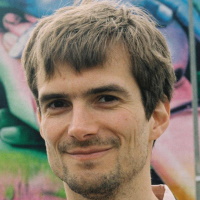
My name is Christoph Daube: I am a newly apponited lecturer here in the School of Psychology & Neuroscience. I am interested in the auditory processing of speech as well as the visual processing of faces. What happens to the soundwaves once they have hit our eardrums, or the light once it has excited the rods and cones of our retina? How do we arrive at an abstract understanding of the stimuli presented to us? And what can neuronal or behavioural responses tell us about these latent processes? I try to gain insights into these questions through the perspectives offered by deep neural networks, magnetoencephalography and information theory.
Lisa DeBruine
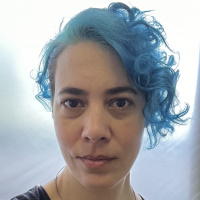
My name is Lisa DeBruine: I am Professor in Psychology in the School of Psychology & Neuroscience here at the University of Glasgow, leading the FaceLab (see link above). My research interests include the links between human facial resemblance and kinship, the behavioural immune system and how pathogens influence mating and social behaviours, and meta-science. I am also interested in tools for open science, team science (particularly the Psychological Science Accelerator), data simulation, workshops on computational skills including R, Tidyverse, GitHub, and making websites.
Ana González-Rueda
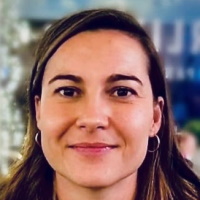
My name is Ana González-Rueda: I am a newly appointed lecturer here in the School of Psychology & Neuroscience. I am an experimental neuroscientist interested in how neuronal connectivity forms and is shaped to endow neuronal networks with their unique computational abilities. My research focuses on the dynamics of how sensory information is perceived and then transformed into motor outputs and on studying neuronal circuits’ ability to adapt in order to support diverse and sometimes opposing behaviours.
Biography
I obtained my BSc in Human Biology and an MRes in Biomedical Research from Universitat Pompeu Fabra, Barcelona, sparking my interest in synaptic plasticity's role in shaping neuronal connections. This led me to the University of Cambridge and Professor Ole Paulsen’s lab, where my MRes project and subsequent PhD research, funded by a Michael Foster Scholarship in Physiology, focused on how neuronal connections can be dynamically modified through synaptic plasticity, particularly during sleep. My doctoral research revealed that sleep enhances the efficiency of information storage in the brain by selectively preserving strong neuronal connections associated with specific concepts or memories while eliminating weaker ones.
Post-PhD, I joined Marco Tripodi's lab at the MRC Laboratory of Molecular Biology first as an MRC postdoctoral Career Development Fellow and then as a Henslow Research Fellow. There, I studied how the brain interprets and transforms sensory information into motor actions I discovered that our brain acts like a motion sensor by prioritising the movement of sensory targets to drive behaviour—an insight that challenges traditional views of sensorimotor transformations.
Research Interests
At the University of Glasgow, my lab will examine the intersection of circuit plasticity and sensorimotor encoding, employing electrophysiology, viral and genetic tools, and behavioural tasks. We aim to understand how neuronal sensorimotor circuits support diverse behaviours and adapt to new or changing behavioural demands. This research will advance our understanding of neural plasticity and circuit functionality, with potential applications in treating neurological disorders.
Biography
I obtained my BSc in Human Biology and an MRes in Biomedical Research from Universitat Pompeu Fabra, Barcelona, sparking my interest in synaptic plasticity's role in shaping neuronal connections. This led me to the University of Cambridge and Professor Ole Paulsen’s lab, where my MRes project and subsequent PhD research, funded by a Michael Foster Scholarship in Physiology, focused on how neuronal connections can be dynamically modified through synaptic plasticity, particularly during sleep. My doctoral research revealed that sleep enhances the efficiency of information storage in the brain by selectively preserving strong neuronal connections associated with specific concepts or memories while eliminating weaker ones.
Post-PhD, I joined Marco Tripodi's lab at the MRC Laboratory of Molecular Biology first as an MRC postdoctoral Career Development Fellow and then as a Henslow Research Fellow. There, I studied how the brain interprets and transforms sensory information into motor actions I discovered that our brain acts like a motion sensor by prioritising the movement of sensory targets to drive behaviour—an insight that challenges traditional views of sensorimotor transformations.
Research Interests
At the University of Glasgow, my lab will examine the intersection of circuit plasticity and sensorimotor encoding, employing electrophysiology, viral and genetic tools, and behavioural tasks. We aim to understand how neuronal sensorimotor circuits support diverse behaviours and adapt to new or changing behavioural demands. This research will advance our understanding of neural plasticity and circuit functionality, with potential applications in treating neurological disorders.
Roddy Grieves
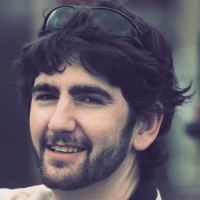
My name is Roddy Grieves: I am a behavioural neuroscientist, and newly appointed lecturer in the School of Psychology & Neuronce. My research looks to understand how spatial neurons in the brain map the animal's surroundings, aid memory and contribute to learning and decision making, with a special focus on naturalistic behaviours and environments. This work involves recording the activity of single neurons in the brain of freely moving animals, especially rats.
Biography
I received a PhD in Psychology from the University of Stirling, under the supervision of Prof Paul Dudchenko and mentorship of Prof Emma Wood. As a postdoc I worked with Prof Kate Jeffery at UCL, then with Prof Jeffrey Taube at Dartmouth College. I am now a Lecturer in the School of Psychology and Neuroscience at the University of Glasgow.
Biography
I received a PhD in Psychology from the University of Stirling, under the supervision of Prof Paul Dudchenko and mentorship of Prof Emma Wood. As a postdoc I worked with Prof Kate Jeffery at UCL, then with Prof Jeffrey Taube at Dartmouth College. I am now a Lecturer in the School of Psychology and Neuroscience at the University of Glasgow.
Shajan Gunamony

My name is Shajan Gunamony: I am senior research fellow and head of MRI RF Engineering, based at the Imaging Centre of Excellence (ICE) at Queen Elizabeth Hospital working with the 7T scanner there. My specialism is radiofrequency (RF) coil development and in 2017 I set up MR CoilTech (see link above), to develop specialised RF coils to enable greater resolution in brain scanning. This will allow researchers to learn more about brain conditions such as stroke, vascular dementia, brain tumours, Parkinson’s and Alzheimer’s Disease than previously possible.

